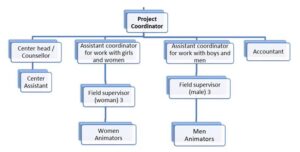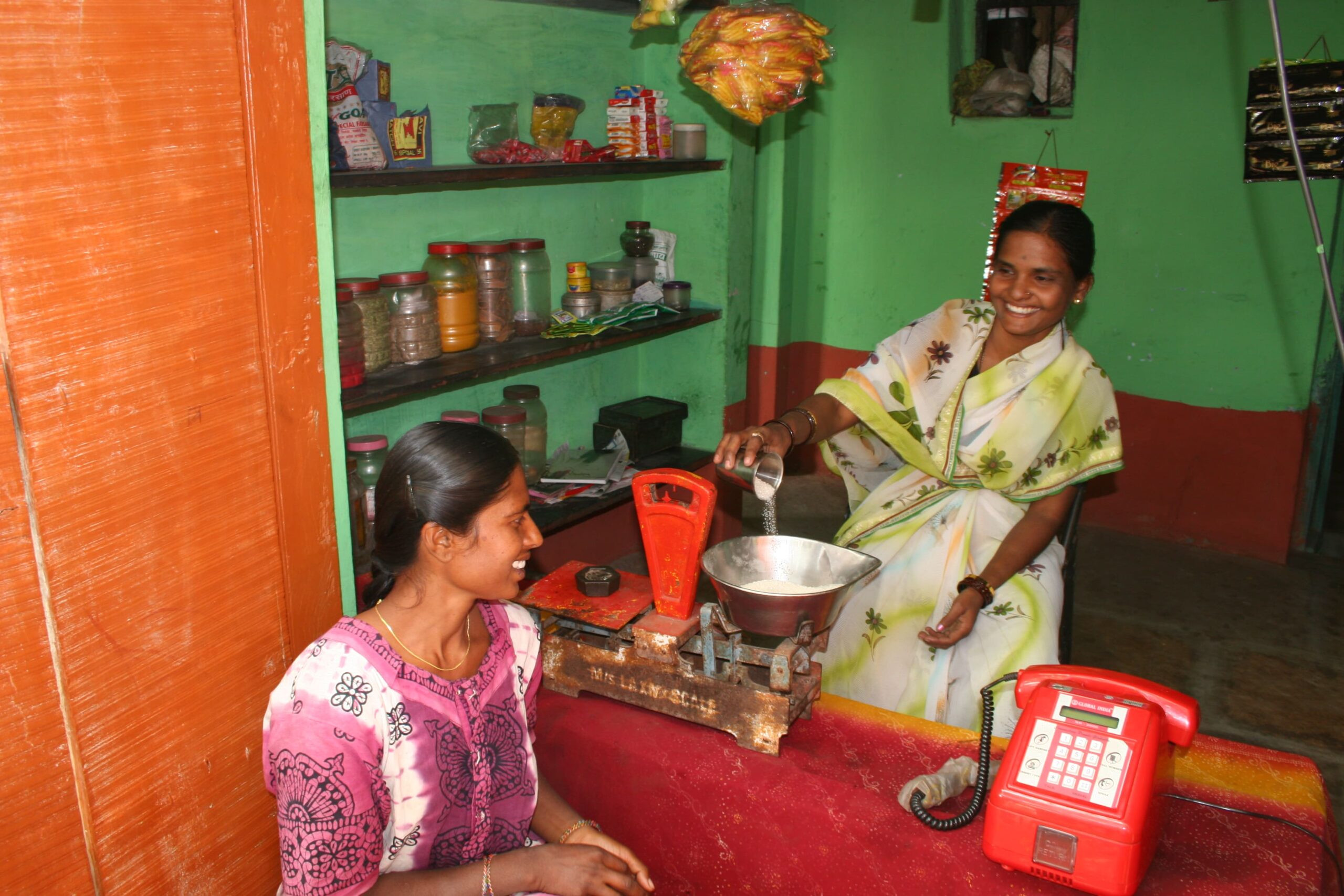Overview
Building on the experiences and lessons learned from previous programs, HMF has significantly enhanced its potential to expand into new villages. The credibility and trust it has earned over the years have enabled HMF to intervene in 30 additional villages within its project areas.
The three-year ‘Gender Equality Project’ mirrored the ‘Gender Campaign Project’ but with some additional components and increased vigour. This initiative specifically focuses on addressing domestic violence and promoting gender equality in these new geographical locations.
Key Enhancements in the Gender Equality Project:
The following strategic enhancements aimed to create a robust support system and foster an environment of gender equality and safety across the newly targeted villages.
- Inclusion of Women Animators: Alongside men community Animators, women Animators were appointed and trained to ensure a more comprehensive approach.
- Programmes for Newly Married Couples: Programs were conducted to nurture healthy intimate relationships, complemented by pre-marriage counselling for the unmarried.
- Focus on Adolescent Girls: Special emphasis was placed on programs for unmarried adolescent girls, to address their vulnerability to child marriage.
- Engagement with Adolescent Boys: Unmarried adolescent boys were targeted to foster gender-equitable attitudes and behaviour
- Intensified Government Stakeholder Engagement: Enhanced collaboration with government duty bearers under the Protection of Women from Domestic Violence Act, 2005.
Limitations posed due to COVID19 pandemic
Amidst the challenges posed by the COVID19 pandemic since March 2020, the subsequent lockdowns, and the waves that followed, the project experienced a slowdown. HMF staff, project staff and numerous animators rallied to provide relief and support in this emergency situation. With approval of the grant donors, budgets were reallocated to prioritize relief work. Once the pandemic situation improved and lockdown restrictions were lifted, the project resumed its activities.
Implementation site:
Through this project, HMF reached out to a population of 38,297 in the 30 villages that included 18883 female and 19634 male population in 8593 households in the Tuljapur and Lohara blocks of the Dharashiv district.
Approach:
Prevention of DV as a necessary component in response, protection and support of domestic violence survivors.
Multi sectoral approach individual, inter personal, community, service and policy aspects while addressing violence and discrimination against women.
Key Interventions and Activities:
Appointment and capacity building of project staff

- Conducted induction training, workshops, reviews and supervision to build capacities of the project staff
Engaged with Boys and Men, and Girls and Women
Boys and Men’s groups (Lakshya Gat): conducted by men animators with support from the field staff.
- Formed groups of unmarried boys (18-24 years) and married men (13-49 years) and met regularly to discuss domestic violence, child marriage, healthy relationships, gender, and gender equality.
- About 660 unmarried boys and 450 married men from 30 villages participated with about 8-10 meetings held annually in each village
For Girls and Women’s groups (Lakshya Gat): conducted by women animators with support from the field staff.
- Formed groups of unmarried girls (11-19 years) and married women (13-49 years) to discuss similar topics.
- On average, 16 to 20 girls and women from each village participated, with 8-10 meetings held annually.
Mobilized the Community on Gender and Domestic Violence
Peer Educators:
- Identified and trained five peer educators per group (married men, unmarried boys, married women, unmarried women) for community education.
- Peer educators helped prevent 22 child marriages in 2021.
Support groups:
- Initiated support groups for domestic violence survivors among Lakshya Gat
Developed and Used IEC and Training Materials
- Developed campaign materials, including posters on child marriage, its ill effects and legal implications.
- Under the ‘DEVELOP’ Project (2020), a collaborative initiative between HMF, SWISSAID, and Hull University, UK, a set of five ‘User Manuals’ were developed on the topics of Gender, Patriarchy, Sexuality, Domestic Violence and Law, and Healthy Relationships. These manuals included not only written instructions on conducting activities related to each topic but also incorporated attractive and engaging media such as games, film clips, and case stories. This multimedia approach was designed to help Animators and field staff conduct interactive and effective activities with the Lakshya Gats.
Advocacy events
- Conducted campaigns against child marriage and domestic violence to increase visibility and recognition.
- 184 men and 174 youth advocated for the establishment of Child Protection Committees in their villages.
- Signature campaigns saw 797 women, 647 girls, and 300 community members pledge against domestic violence and child marriage.
- In 2021, 797 women, 647 girls and 300 other members of the community signed on the pledge against domestic violence and child marriage.
Developed a Cadre of Male and Female Community Animators
- Appointed one male and one female animator in each of the 30 project villages.
- Animators, who are village youth, adopt gender-equitable practices and act as ambassadors for gender equality and women’s empowerment.
- Conducted approximately six training workshops, including refresher sessions, for animators.
- Held monthly review meetings for ongoing capacity building.
Conducted Relationship Building, Nurturing Programmes
- Conducted annual meetings with newly married couples in each village, including a centralized convention in 2019 with about 200 couples participating.
Provided Support to Domestic Violence Survivors
- Provided counselling, support, and referrals to girls and women survivors of domestic violence.
- Offered livelihood support, including linkages with skill training centers, partial financial support, assistance in accessing social security schemes,
- 112 women approached the Savali Centre during the project period; the COVID 19 lockdown in 2020 through 2021 posed limitations on referrals and services.
- Conducted skill training for livelihood particularly for single women and domestic violence survivors in collaboration with the District Industries Centre with 150 women participating in it.
- Assisted women for obtaining ration cards for subsidized foodgrains.
Empowerment of Unmarried Girls/Adolescents
- Established Village-level Centres (‘Empowerment Centers’) in nearly all 30 villages. They had equipment for indoor and out doorgames, a library, and other activities, facilitated by the local women animators.
- In 2021, 288 girls learned cycling, and 284 accessed books in the library.
Engagement with government stakeholders/ duty bearers under the Protection of Women from Domestic Violence Act
- Protection Officers appointed under the Domestic Violence Act were invited to HMF’s project villages to talk to Lakshya gat members on the Law and how Protection Officers can help.
- Lakshya gat members visited the District Legal Aid Authority and Police Station to understand their role and functioning and establish a connect with them.
Outcome: Achievements and Challenges
The Towards Gender Equality Project, for the most part, coincided with the COVID19 pandemic and subsequent lockdowns, and posed challenges. Amidst limitations, the project achieved the following:
- It facilitated campaigns towards awareness-raising and information-dissemination on gender-based violence and discrimination, particularly domestic violence and child marriage.
- Through group meetings, whenever feasible and the means available e.g. pamphlet distribution, wall paintings, legal counselling, etc., the project managed to raise awareness on issues of domestic violence and child marriage, on relevant laws and recourse under them, on reporting procedures for DV and CM, and on services available through formal institutions and government agencies as well as support from informal community-based mechanisms, and such other.
- It has facilitated the formation of Community Animators and village-level community support groups who in turn would reach out to more girls, women, boys and men.
- It has mobilized support for girls and women survivors of domestic violence in the most trying circumstances that saw a rise in such cases, especially between 2020 to 2021.
- In spite of the circumstances due to lockdowns and the relief operations carried out, the Project showed progress in addressing to domestic violence prevention and response.
- It particularly and provided learnings and insights on how to address issues of domestic violence and child marriage during humanitarian crisis such as the COVID19 pandemic.
Financial Partner
SWISSAID under its project titled: “Addressing Gender-based Discrimination and Domestic Violence in Marathwada Region of Maharashtra, India”
